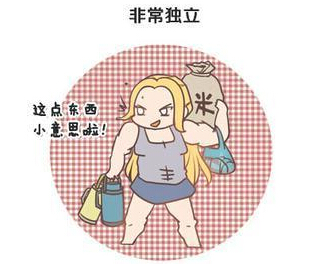(单词翻译:单击)

A submissive and clinging woman, or an unceremonious and independent woman, which one would you prefer? A recent poll shows that most people would choose the latter.
百依百顺、黏黏糊糊的女人vs不拘小节、独立自主的女人,你更喜欢哪一个?最近一项调查显示,大部分人选择后者。
This type of woman is called a nühanzi (“tough woman”) and always takes care of herself. Experts believe these characteristics have social and psychological roots among young females in China.
这一类女性被称作“女汉子”,她们往往自己照顾自己。专家认为,这种性格与中国年轻女性的社会与心理现状息息相关。
Su Hao’s friends all call her a tough woman, because the 19-year-old English major at Shandong University can finish tough tasks usually attributed to men. For example, she carries 10-litre water bottles to her dormitory on the 5th floor and can fix a broken fan. “I depend on no one but myself,” she says.
苏晧(音译)来自山东大学英语专业,朋友们都叫她“女汉子”,因为这个19岁的姑娘能完成一些男生干的体力活儿。例如,她能一个人扛着10升水上5楼宿舍,还能修电扇。她说,“我只靠自己。”
According to a recent survey by China Youth Daily, tough women have become rather common in society. Of the 21,265 respondents, 78.5 percent said they are acquainted with a tough woman. About 50 percent said they like women with tough characteristics, while less than 29 percent expressed the opposite view.
《中国青年报》最新调查显示,时下“女汉子”十分普遍。在21265受访者中,有78.5%的人都认识 “女汉子”,约50%的人喜欢“女汉子”,而只有不到29%的人持反对意见。
Why are tough women gaining popularity? Shen Meng, a certified psychological counselor, believes the fierce competition in society is contributing to this trend.
为什么“女汉子”如此流行?心理咨询师沈梦(音译)认为,当前社会激烈的竞争是造成这种趋势的原因之一。
“Women are often in a disadvantaged position compared to men,” Shen says. “In order to survive, they have to be independent, strong and tough.”
她说“相较于男人,女人(在社会竞争中)常处于劣势地位。为了生存,她们不得不变得独立、坚强和强势。”
Liu Xiaolin, professor of psychology at Wuhan Mental Health Center, believes tough women are nurtured this way.
然而,来自武汉心理健康中心的心理学教授刘晓林(音译)则认为,“女汉子”是天生的。
“They are often on intimate terms with their fathers, who teach their daughters to be brave and decisive,” he says. As a result, these women are more likely to be psychologically healthy and more tolerant to stress, according to Liu.
他说,“这些女性往往和父亲关系亲密,被父亲教育成勇敢而有决断力的人。”因此,她们的心理更健康,更能够承受压力。
Though Liu believes that this is a good trend, Hu Shenzhi, a psychologist at the Guangdong Sunflower Counseling Center, says the prevalence of tough woman indicates a blurred line between gender identities, which can lead to relationship problems.
尽管刘晓林认为这是一个好趋势,来自广东向日葵咨询中心的心理学家胡申志(音译)则认为,女性越来越强势的趋势意味着性别差异的模糊化,这有可能会带来两性关系问题。
“Some women with characteristics that deviate from the traditional female image may have a difficult time finding Mr Right,” he says. “Even if they get married, their manly characteristics might trigger family conflicts.”
他说,“一些与中国传统女性性格相去甚远的女性更难找到另一半。即使结了婚,她们的‘男子气概’也很可能造成家庭矛盾。”


